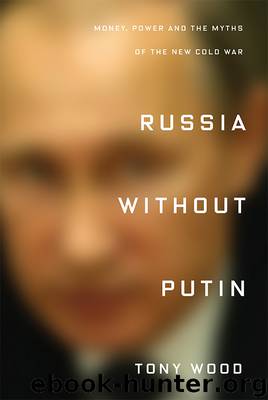Russia Without Putin by Tony Wood

Author:Tony Wood
Language: eng
Format: epub
Publisher: Verso Books
Throughout his career as a public figure – from LiveJournal entries in the 2000s to his spearheading of the 2017 protests – the core of Navalnyi’s popular appeal has been his relentless opposition to corruption. But this does not in itself amount to a political philosophy, let alone a programme. For that, we need to look beyond Navalnyi’s activism. We can get a good idea of the policies he might put forward from the platform agreed by his Party of Progress in 2014.20 Some of its recommendations are aimed at undoing the most autocratic features of Putinism: reductions in the power of the presidency; shortening of presidential terms back to four years; introduction of stricter term limits; lowering of the threshold for parliamentary representation, and easing of restrictions on registering parties.
Elsewhere the document calls for basic political and civil rights – freedom of the press, freedom of assembly, religion and expression – that have been curtailed under Putin. Legal reforms would seek to protect the independence of the judiciary, and to make the police more accountable to the citizenry. Authority should be decentralized, devolving more power to the regional and municipal levels. The current ‘bias’ in federal funding for the North Caucasus should be brought to an end, though the means for doing this remain unspecified. On migration, the document calls for a visa regime and quotas to be introduced, first and foremost for the Central Asian republics, in order to moderate the currently ‘uncontrolled’ flow of migrants.
In the realm of foreign policy, the document calls for a rapprochement with the West, which it sees as sharing basic strategic interests with Russia: a reduction in global tensions, the struggle with terrorism, freedom of trade. Behind these overlapping interests lies a deeper commonality of values: the text describes Russia as ‘part of European civilization, where ever greater significance is given to the freedom, self-respect and responsibility of the individual, and the interference of the state in various spheres of human interaction is less and less necessary’. This is, of course, a highly tendentious reading of what would constitute ‘European’ civilization, if such a thing existed: it refers at most to the dominant ideological tendency of the past thirty years, derived from the ideas of Friedrich Hayek and Milton Friedman and put into practice by Thatcher, Reagan and their many heirs.
Indeed, the Party of Progress platform firmly places it in this neoliberal lineage in the social and economic spheres, with prescriptions drawn from the standard repertoire of the US and European centre-right. Russia’s ills are held to stem from the overweening power and reach of the state, and should be remedied by deregulation, cutbacks in the number of government functionaries, and privatizations to reduce the weight of the state in the economy. The current flat income tax rate should be supplemented with wealth and property taxes, but there should be no shift to progressive taxation, since this would penalize the middle class. Welfare should be targeted and recipients rigorously means-tested, and whatever social guarantees the state provides should not interfere with economic growth and competitiveness.
Download
This site does not store any files on its server. We only index and link to content provided by other sites. Please contact the content providers to delete copyright contents if any and email us, we'll remove relevant links or contents immediately.
| Anthropology | Archaeology |
| Philosophy | Politics & Government |
| Social Sciences | Sociology |
| Women's Studies |
The Secret History by Donna Tartt(19028)
The Social Justice Warrior Handbook by Lisa De Pasquale(12182)
Thirteen Reasons Why by Jay Asher(8883)
This Is How You Lose Her by Junot Diaz(6872)
Weapons of Math Destruction by Cathy O'Neil(6261)
Zero to One by Peter Thiel(5782)
Beartown by Fredrik Backman(5734)
The Myth of the Strong Leader by Archie Brown(5491)
The Fire Next Time by James Baldwin(5423)
How Democracies Die by Steven Levitsky & Daniel Ziblatt(5211)
Promise Me, Dad by Joe Biden(5139)
Stone's Rules by Roger Stone(5079)
A Higher Loyalty: Truth, Lies, and Leadership by James Comey(4946)
100 Deadly Skills by Clint Emerson(4911)
Rise and Kill First by Ronen Bergman(4775)
Secrecy World by Jake Bernstein(4738)
The David Icke Guide to the Global Conspiracy (and how to end it) by David Icke(4696)
The Farm by Tom Rob Smith(4500)
The Doomsday Machine by Daniel Ellsberg(4481)
